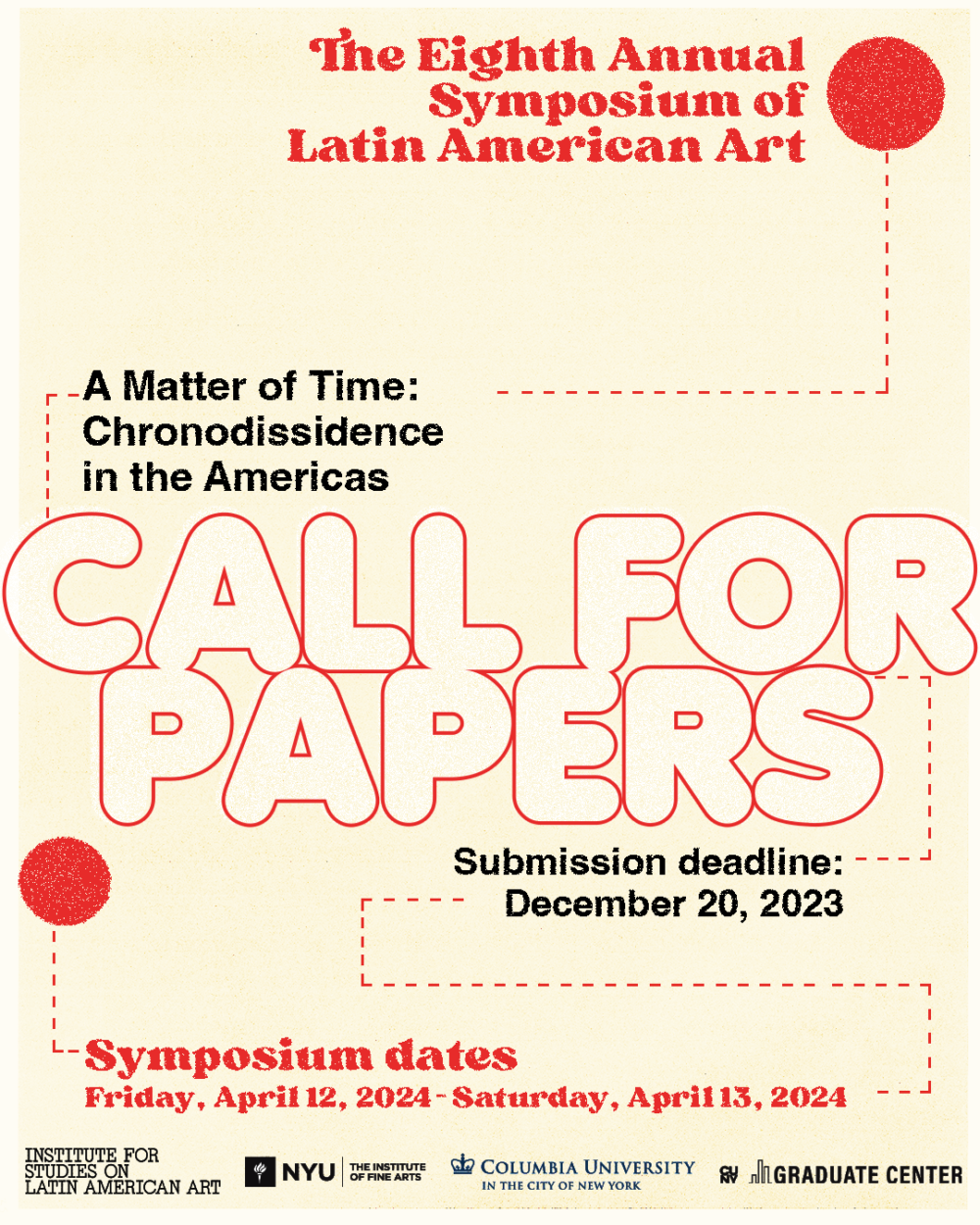Call for Papers: “A Matter of Time: Chronodissidence in the Americas”
Call for Papers: “A Matter of Time: Chronodissidence in the Americas”
Eighth Annual Symposium of Latin American Art
Institute for Studies on Latin American Art (ISLAA), New York, April 12–13, 2024
Deadline extended: January 7, 2024
The Institute for Studies on Latin American Art (ISLAA) is pleased to announce the Eighth Annual Symposium of Latin American Art, organized by graduate students from Columbia University; The Graduate Center, City University of New York (CUNY); and the Institute of Fine Arts, New York University (NYU). The symposium will take place at ISLAA, New York, from April 12 to 13, 2024, and feature poet, essayist, playwright, and professor Leda Maria Martins as its keynote speaker.
“A Matter of Time: Chronodissidence in the Americas” invites proposals from artists, activists, graduate students, and emerging scholars whose work channels flexible, nonlinear, and otherwise “errant” temporalities. The symposium welcomes scholarly and artistic considerations of time as matter, method, and approach. This year’s theme expands on Miguel A. López’s concept of chronodissidence (introduced in an essay on Peruvian artist Teresa Burga), which he defines as “practices that subvert, differ from, or dismantle . . . the dominant model of time that turns asymmetrical power regimes into apparently normal routines.” Seeking critical responses to the ways art and visual culture trouble time’s encoding of racialized, colonial, and gendered logics, “A Matter of Time” opens a conversation around unfixed temporalities that evince plurality, experimentation, and resistance.
The Eurocentric study of art in the Americas, and in particular Latin American and Caribbean practices, has been plagued by patronizing characterizations of “lateness,” “belatedness,” and “backwardness” that treat linear time as fact. Relatedly, a strain of foundational fictions and scholarly narratives has reified a romanticized, harmonious connection between the region’s ancient cultures and “postcolonial” presents. Rather than rehash parochial debates and their aftereffects, “A Matter of Time” surfaces alternative ways of thinking about time in the Americas, foregrounding expansive and open-ended conceptions of temporality, chronology, sequencing, (dis)continuity, and (a)synchrony.
In approaching dissident temporalities as subject matter, methodology, and theoretical provocation, this year’s symposium takes cues from the work of such scholars as Leda Maria Martins (on “spiral time” and performance), Jerry Philogene (on “zombie time” and social death in Haiti), and Sandra Ruiz (on aesthetic interventions in “colonial time” in Puerto Rico). Over two days of presentations, we ask: how do temporal patterns and flows choreograph social life, state power, history, memory, and political possibility? What strategies have been (and can be) deployed for theorizing the art and visual culture of the Americas in an open and fluid relationship to time? What historical and/or enduring views of nonlinear time have marked this region? And how do imaginative, speculative temporalities transmute our ever-unfolding presents and futures?
Possible themes include, but are not limited to:
- Indigenous temporalities and cosmovisions
- Time, vertigo, and memory in the Black Atlantic
- Temporal geographies, including transatlantic and Pacific interventions
- Invocations of time in religious, spiritual, and embodied practices
- Collisions in temporal modalities wrought by European colonialism and “Western” imperialism
- Queer temporalities, temporal drag, and futurity
- Time-based practices, including experimental film, performance, dance, and music
- Looping, cyclicality, spirals, and repetition
- Discontinuity, delay, and anachronism
Presentations spanning Latin American, Caribbean, Latinx, and transnational topics from all historical periods (e.g., ancient Americas, colonial, modern, and contemporary) and from fields beyond art history (e.g., visual culture, cinema and media, Latin American and Caribbean studies, Latinx and Chicanx studies) are highly encouraged. Presentations will be accepted in English, Spanish, and Portuguese; proposals in languages not mentioned here are also welcome and will be considered on a case-by-case basis.
To apply, please submit an abstract of up to 300 words and a short CV to latamartsymposium@gmail.com by Sunday, January 7, 2024. In your application, please indicate your current institutional affiliation, from where you would be traveling, and the languages you speak. Applicants will be notified of their acceptance by early February. Presentations will be limited to 20 minutes and followed by a panel discussion with an invited scholar.
The Annual Symposium of Latin American Art is organized by Ana Luiza de Abreu Claudio and Luise Malmaceda (Columbia University), Suzie Oppenheimer and Laura C. Suárez Rodríguez (The Graduate Center, CUNY), and Cristalina Parra and Joseph Shaikewitz (Institute of Fine Arts, NYU). The faculty advisors are Jerónimo Duarte-Riascos, Assistant Professor, Department of Latin American and Iberian Cultures, Columbia University; Anna Indych-López, Professor, Art History, The Graduate Center and The City College of New York, CUNY; and Edward J. Sullivan, Helen Gould Shepard Professor in the History of Art, Institute of Fine Arts, NYU. Blanca Serrano Ortiz de Solórzano, Project Director at ISLAA, offers additional advisory support.
About ISLAA
Founded in 2011, the Institute for Studies on Latin American Art (ISLAA) supports the study and visibility of Latin American art. ISLAA recognizes Latin American artists and cultural movements as integral to the trajectory of twentieth- and twenty-first-century art. ISLAA seeks to expand these narratives by creating opportunities for researchers, curators, and the public through grants, exhibitions, publications, and our art and archival collections. ISLAA’s partnerships with educational and art institutions include New York University, Columbia University, CCS Bard, the New Museum, and Dia Art Foundation. Learn more at islaa.org
About The Annual Symposium of Latin American Art
Established in 2016, the Annual Symposium features graduate students, scholars, and artists, who present original research and discourse on Latin American and Latinx art and visual culture. This international event is supported by ISLAA and organized by graduate students at the Institute of Fine Arts, New York University; the Graduate Center, City University of New York; and Columbia University.
For further information or any questions, please contact latamartsymposium@gmail.com.
